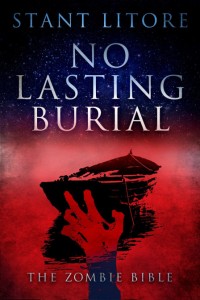 The admins of Fantastic Reviews attend our Book Club, and they passed a copy of Stant Litore’s “No Lasting Burial”
The admins of Fantastic Reviews attend our Book Club, and they passed a copy of Stant Litore’s “No Lasting Burial” to me, as they figured it would be right up my alley (they were right). Litore is a local author, and he’s interested in reviews, so they asked me if I’d be willing to write a review for the book. I couldn’t say no to that, so here it is!
No Lasting Burial is part of Stant Litore’s “Zombie Bible” series – retellings of Bible stories in a world plagued by zombies. Right away I was intrigued, as I love religious stories and I thought a zombie infusion could make for some excellent reading. I was, however, somewhat led astray by the back-cover summary, which calls “No Lasting Burial” a retelling of the Gospel of Luke. At first I thought NLB was suffering from a bad case of Not Getting To The F*cking Monkey since we don’t see the Messiah until about 1/3rd of the way through the book (aside from a brief intro right at the end of chapter one). However as I continued in the book I realized this was not the fault of Litore, but of whoever wrote the back-cover summary. This is not a retelling of the entire Gospel of Luke, it is a retelling of the calling of Simon Peter, James, and John. So the first dozen verses of chapter 5 of Luke. However I don’t want this to come across as a criticism because the retelling is masterful and the book is the perfect length to explore the story that is being told with the full depth that Litore has given in. I just wanted readers to be aware so they aren’t frustrated.
Two major themes run through this book. The first is the survival of violent abuse. The entire village that the story takes place in suffered an extreme collective trauma, first as it was sacked by Romans, and then as it was overrun by zombies. The violence is gritty and real and portrayed from the viewpoint of a child, which makes it more horrifying. Fortunately the majority of the atrocities are only alluded to, as the child hides in a tomb and helps with a childbirth amidst the chaos. The psychological impact of this violence scars all the survivors and is reflected in their every action for decades. They were never allowed to heal, as the poisoning of The Sea of Galilee visits zombie incursions into their town sporadically. The tension, the constant PTSD-like fear, drips from the page. It’s an amazing portrayal of a damaged community, and I felt paranoia and despair clawing up my chest and suffocating me in every chapter. It is intensely well written, and it strongly affected my overall mood during the week I was reading this. Stant Litore knows his shit.
The second major theme is that of forgiveness. Specifically, the act of forgiving being the only way to heal and move forward in the face of such unforgivable acts. The burden of hatred, of revenge, of honor and law, keeps all these wounds fresh and keeps tearing people down. Souls are crushed under the strain, because it’s simply too vast to ever be reconciled justly, and the result is just more pain. But for everyone to come together and forgive, unconditionally, and start anew with a clean slate… to let the old hurts go so they no longer goad and spur and torment you… is nearly impossible. It would take an Act of God to move such a weight. Which is why people often will not budge until they finally break down into a full religious experience. In this case that religious experience is literal, as a Messiah half-mad with grief, and burning with destiny, comes into their community and slowly, against their thrashings and screams, brings them healing and forgiveness.
This book does a far better job of portraying the gospel message of forgiveness and God’s unconditional acceptance than the actual Gospels ever did. Which one could interpret as damning with faint praise, as the actual text of the Gospels is fairly lame. It’s always in the churches that the true message is conveyed, by powerful preachers and strong communities that understand what the text was trying to say. So let me clarify – this is a damn good book, and it does exactly what it set out to do with flying colors. If my childhood church had half of Litore’s understanding of the forgiveness message of Jesus, and even a fraction of his ability to convey it, maybe I would still be some flavor of Christian today. Maybe. They didn’t, and I am glad for that. But through this book I was finally able to understand just what it is so many people see in Christianity. On an emotional level it’s very appealing.
The book does have some flaws. Most noticeably, it tends to use too many words. Sometimes entire paragraphs could have been shortened to a single sentence without losing anything of substance, and some points are belabored a few times. It’s a small price to pay. I recommend the book highly.
No Responses to “Bonus Review: No Lasting Burial”